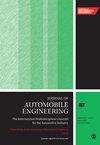基于 Q-learning 算法的纯电动汽车低温热管理系统多目标控制策略研究
IF 1.5
4区 工程技术
Q3 ENGINEERING, MECHANICAL
Proceedings of the Institution of Mechanical Engineers Part D-Journal of Automobile Engineering
Pub Date : 2024-07-26
DOI:10.1177/09544070241265984
引用次数: 0
摘要
在低温条件下,合理的热管理系统控制策略可以有效缓解纯电动汽车的续航焦虑,提高其对各种工况的适应性。为进一步提高热管理系统控制策略在不同工况下的适应性,本文提出了一种基于 Q-learning 算法的多目标控制策略。首先,建立了基于功率-热耦合的纯电动汽车模型。通过比较 Amesim 和 Matlab/Simulink 仿真结果与实验数据,验证了模型的准确性。其次,考虑到车辆经济性、动力总成性能和座舱舒适性等因素,针对纯电动汽车热管理系统开发了一种利用 Q-learning 算法的新型控制策略。最后,通过在初始温度为 -20°C 的 NEDC 和 WLTC 条件下进行模拟,分析了 Q-learning 控制策略的有效性。结果表明,在 WLTC 和 NEDC 工况下,与基于规则的控制策略相比,Q-learning 控制策略的综合改进效果分别为 9.35% 和 10.76%。此外,Q-learning 控制策略分别达到了通过 DP 获得的全局最优控制效果的 94.25% 和 90.19%。结果表明,所提出的控制策略对不同工况具有良好的适应性。本文章由计算机程序翻译,如有差异,请以英文原文为准。
Research on multi-objective control strategy of thermal management system of pure electric vehicle at low temperature based on Q-learning algorithm
In low-temperature conditions, a reasonable control strategy for thermal management systems can effectively alleviate range anxiety in pure electric vehicles and improve their adaptability to various working conditions. To further enhance the adaptability of thermal management system control strategies in different working conditions, this paper proposes a multi-objective control strategy based on Q-learning algorithm. Firstly, a pure electric vehicle model based on power-thermal coupling is established. The accuracy of the model is validated by comparing the simulation results from combined Amesim and Matlab/Simulink simulations with experimental data. Secondly, taking into consideration the factors such as vehicle economy, powertrain performance, and cabin comfort, a novel control strategy utilizing the Q-learning algorithm for the thermal management system of pure electric vehicle is developed. Finally, the efficacy of Q-learning control strategy is analyzed by simulations conducted under NEDC and WLTC conditions, with an initial temperature of −20°C. The results showed that, compared to the rule-based control strategy in WLTC and NEDC working conditions, the comprehensive improvement effect of Q-learning control strategy is 9.35% and 10.76% respectively. Moreover, the Q-learning control strategy achieves 94.25% and 90.19% of the global optimal control effect obtained through DP. The results indicate that the proposed control strategy has good adaptability to different working conditions.
求助全文
通过发布文献求助,成功后即可免费获取论文全文。
去求助
来源期刊

CiteScore
4.40
自引率
17.60%
发文量
263
审稿时长
3.5 months
期刊介绍:
The Journal of Automobile Engineering is an established, high quality multi-disciplinary journal which publishes the very best peer-reviewed science and engineering in the field.
 求助内容:
求助内容: 应助结果提醒方式:
应助结果提醒方式:


